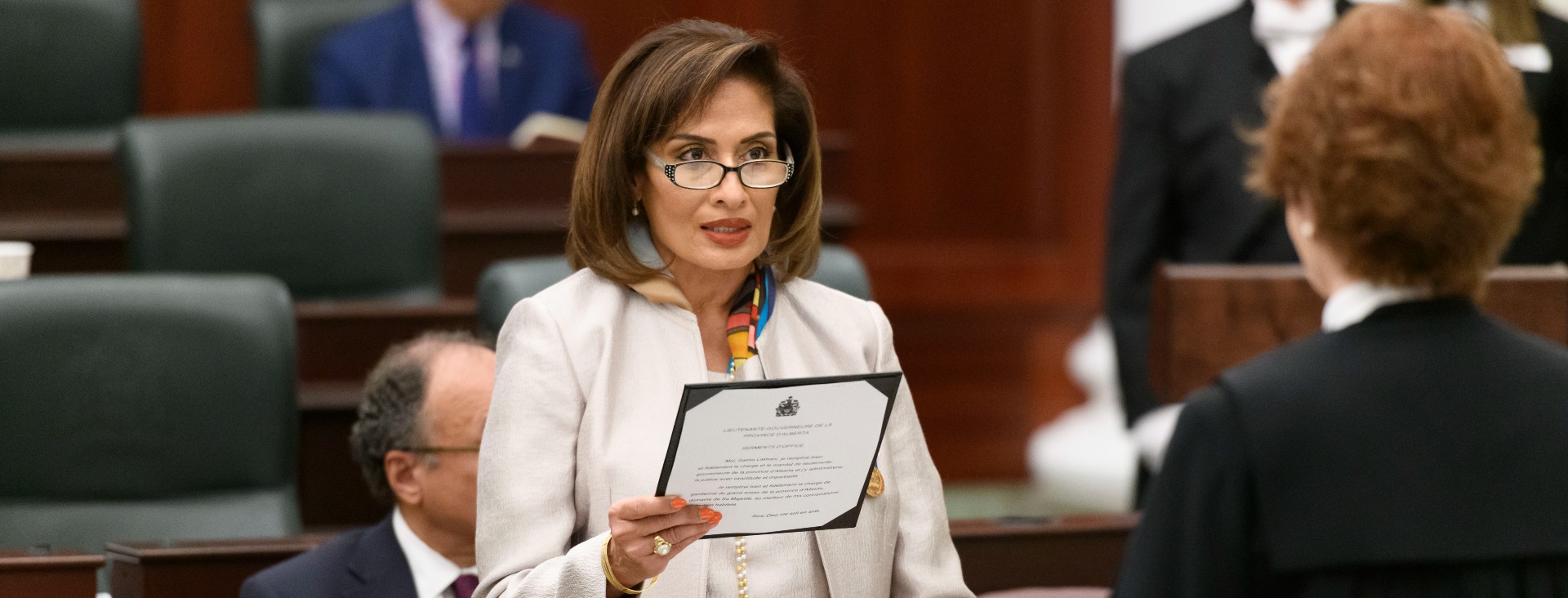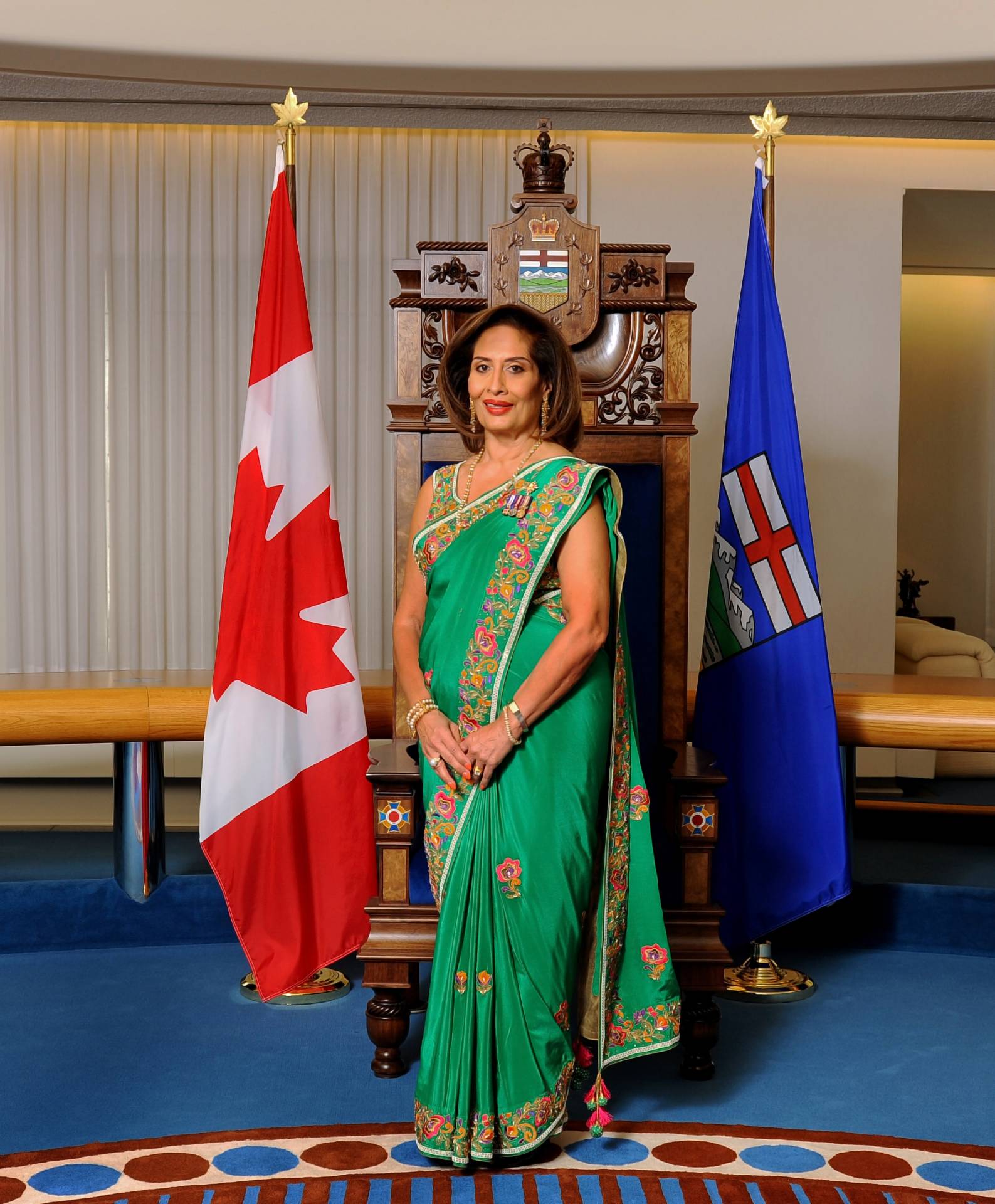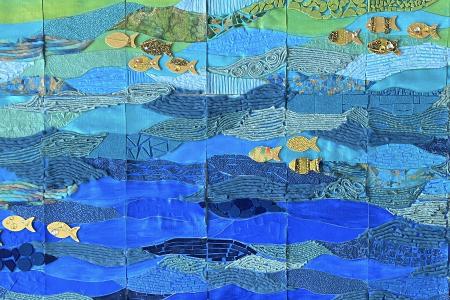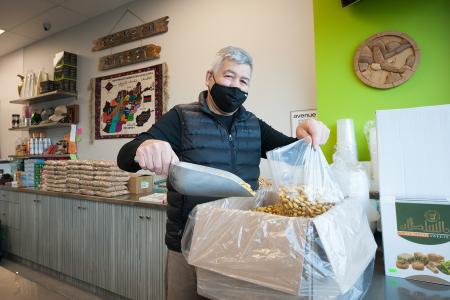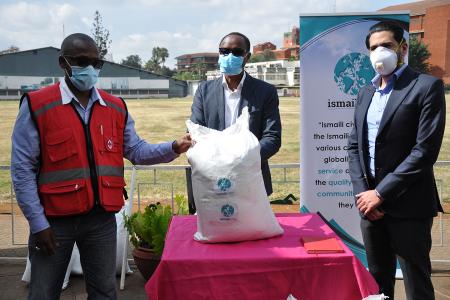Your Honour, you have been in office for a few short months. How has the transition been so far?
Salma Lakhani: Because of the pandemic, I have had time to come to grips with this role. No one ever prepares for a position like this. I feel anxious that I am not able to get out there and get to know my fellow Albertans, especially in rural Alberta, and listen to their aspirations and what matters to them. I would normally be attending five to seven events every day. However, I have been able to reach out to mayors and leaders across the province to find out what is happening in their communities during this time. I also have wonderful staff who have helped me navigate, so the transition has been very good.
What led up to your appointment as Lieutenant Governor?
S.L.: I feel my appointment is a recognition of all the organizations I have supported. I have never asked, “what am I going to get out of this?” I have always wanted to help people, and most of my work has been at the grassroots level. Close to my heart has been my work at NorQuest College, where I mentored people who were disadvantaged, including newcomers and refugees, and helped raise emergency funds for students and daycare. I once mentored a young refugee from the Republic of the Congo who is now running for public office and has set up a scholarship in his own name at Norquest College.
Somebody noticed the work I had been doing over the years and, one day, I got a call from the Prime Minister’s office to say my name had been shortlisted for Lieutenant Governor. I was so overwhelmed, I asked them if they had the right person! My family was very supportive. In June, I received a phone call from the Prime Minister offering me the position. He graciously expressed how he felt the Ismaili community had contributed so much towards building Canada, and he was grateful for that.
What are your main responsibilities as the Queen’s representative?
S.L.: The most important constitutional duty is giving royal assent to bills passed by the legislative assembly that then become law. The ceremonial role, which I find fun, is as important. I preside over award ceremonies and recognize people doing amazing work helping to build communities across the province. This is where I connect with and relate to people.
How does being an Ismaili Muslim or having been stateless bring a unique perspective to this role?
S.L.: Having been stateless has given me empathy for people who have gone through similar situations and experiences that are even more horrific. We left Uganda with nothing and, looking back, were lucky to get out with our lives. I am committed to giving help and hope to people who face barriers to success in life.
Volunteerism is the backbone of our community. We are taught at a very young age to serve in any capacity, and we learn to appreciate the need to contribute to society. In addition we have been taught that, with privilege, comes responsibility. We see how well we do when we support each other, and we can spread this out to other communities.
Canada celebrates diversity and is one of the countries where stories like mine are possible. However, I feel there is a lot more to be done. We all have to work harder to make sure that more and more people can benefit from this promise.
What do you hope to achieve as Lieutenant Governor?
S.L.: Every Lieutenant Governor wants to leave behind a legacy. I am going to take my time to decide on that. To me, education is very important and I say to students I meet that your most important asset is education and no one can take that away from you. I would also like to focus on working with our Indigenous communities—we don’t know enough about our Indigenous brothers and sisters. We really need to have that knowledge going forward, and build on that. I am also keen to highlight people who do grassroots work. These people are our unsung heroes.
Your Honour, you have been in office for a few short months. How has the transition been so far?
Salma Lakhani: Because of the pandemic, I have had time to come to grips with this role. No one ever prepares for a position like this. I feel anxious that I am not able to get out there and get to know my fellow Albertans, especially in rural Alberta, and listen to their aspirations and what matters to them. I would normally be attending five to seven events every day. However, I have been able to reach out to mayors and leaders across the province to find out what is happening in their communities during this time. I also have wonderful staff who have helped me navigate, so the transition has been very good.
What led up to your appointment as Lieutenant Governor?
S.L.: I feel my appointment is a recognition of all the organizations I have supported. I have never asked, “what am I going to get out of this?” I have always wanted to help people, and most of my work has been at the grassroots level. Close to my heart has been my work at NorQuest College, where I mentored people who were disadvantaged, including newcomers and refugees, and helped raise emergency funds for students and daycare. I once mentored a young refugee from the Republic of the Congo who is now running for public office and has set up a scholarship in his own name at Norquest College.
Somebody noticed the work I had been doing over the years and, one day, I got a call from the Prime Minister’s office to say my name had been shortlisted for Lieutenant Governor. I was so overwhelmed, I asked them if they had the right person! My family was very supportive. In June, I received a phone call from the Prime Minister offering me the position. He graciously expressed how he felt the Ismaili community had contributed so much towards building Canada, and he was grateful for that.
What are your main responsibilities as the Queen’s representative?
S.L.: The most important constitutional duty is giving royal assent to bills passed by the legislative assembly that then become law. The ceremonial role, which I find fun, is as important. I preside over award ceremonies and recognize people doing amazing work helping to build communities across the province. This is where I connect with and relate to people.
How does being an Ismaili Muslim or having been stateless bring a unique perspective to this role?
S.L.: Having been stateless has given me empathy for people who have gone through similar situations and experiences that are even more horrific. We left Uganda with nothing and, looking back, were lucky to get out with our lives. I am committed to giving help and hope to people who face barriers to success in life.
Volunteerism is the backbone of our community. We are taught at a very young age to serve in any capacity, and we learn to appreciate the need to contribute to society. In addition we have been taught that, with privilege, comes responsibility. We see how well we do when we support each other, and we can spread this out to other communities.
Canada celebrates diversity and is one of the countries where stories like mine are possible. However, I feel there is a lot more to be done. We all have to work harder to make sure that more and more people can benefit from this promise.
What do you hope to achieve as Lieutenant Governor?
S.L.: Every Lieutenant Governor wants to leave behind a legacy. I am going to take my time to decide on that. To me, education is very important and I say to students I meet that your most important asset is education and no one can take that away from you. I would also like to focus on working with our Indigenous communities—we don’t know enough about our Indigenous brothers and sisters. We really need to have that knowledge going forward, and build on that. I am also keen to highlight people who do grassroots work. These people are our unsung heroes.









